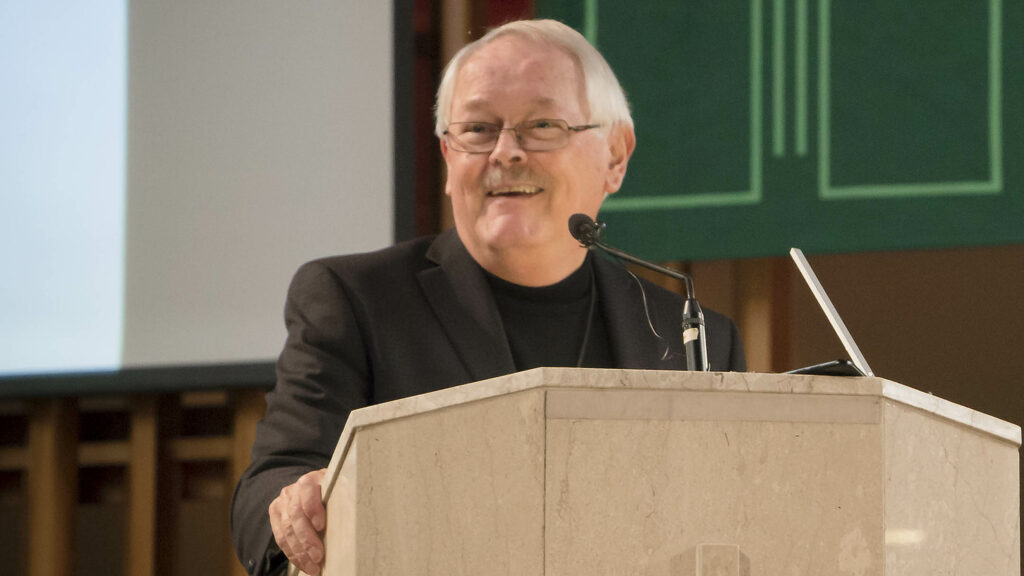Less than two weeks ago 26 people were killed and more than 20 others wounded by a gunman at a church in Sutherland, Texas – the largest mass shooting in the state’s history.
That church is less than 15 minutes from the San Antonio home of Rev. Ron Rolheiser OMI, an internationally known author and speaker on religion in the contemporary world. Rolheiser served and studied in the Edmonton Archdiocese for 18 years before moving south.
The impact of the shooting is still fresh, for him and for many Americans for whom this type of violence has become all too familiar. The Las Vegas Strip, the Pulse nightclub in Orlando, San Bernardino and Sandy Hook are now known not only as place names but as scenes of deadly violence.
In the aftermath, there are often calls to pray for the victims and for the U.S. as a whole. But does prayer really work, especially when there seems to be no end to the violence? Rolheiser has heard that question before.
“Some people say, ‘What’s the power of prayer in all of this?’ Oftentimes it’s the only power we have. Sometimes you watch the news and feel so helpless,” said Rolheiser, who was back in Edmonton for a series of lectures sponsored by Newman Theological College.
“Prayer, often, isn’t to change God’s mind, because God doesn’t interfere a lot with human freedom. It’s to help us understand and cope. We don’t pray to put God on our side. We pray to put ourselves on God’s side.”
For Rolheiser, the shooting in Sutherland Springs hit close to home. He’s president of the Oblate School of Theology, only 55 kilometres away. As his community tries to come to terms with the shooting, Rolheiser stresses that prayer is more than just speaking. It’s doing.
“Prayer isn’t just a passive thing where we pray to God, ‘Stop the shooting.’ Prayer also means that we pray to God, and as Christians, that we actively down here do put skin to our prayer. You’ve got to be doing things politically and socially in your community to stop violence.”
Rolheiser was born in Macklin, Sask., and grew up on the family farm nearby. He was ordained to priesthood as a member of the Missionary Oblates of Mary Immaculate in 1972, and earned a bachelor’s degree in theology from Newman Theological College in Edmonton. He would later earn a master’s degree and Ph.D., and return to Newman to teach theology and philosophy.
While studying in Belgium, Rolheiser began to write a regular column – called “In Exile” – in the Western Catholic Reporter, the newspaper of the Edmonton Archdiocese at the time. Three decades later, Rollheiser’s column is published by almost 100 newspapers worldwide.
Thirteen years ago he moved to the U.S. where, he says, the gun culture has been an education.
“It’s one thing to have a hunting rifle or a little pistol to protect yourself with. But why would someone other than a policeman or a soldier, have an assault weapon?” Rolheiser asked.
“You have a right to drive a car, but you don’t have the right to have a Formula One car on a highway … Assault weapons should never be in the hands of individual people.”
Rolheiser said shootings like Sutherland Springs point to the need to address larger social issues, as well as the need to pair prayer with action.
“For a lot of these people it’s a mental illness. Why is our psyche fracturing today more and more? And not just stopping guns. A lot of it is caused by mental illness. How are we treating the mentally ill? How are we treating immigrants? We have to pray to God, but we also need to try to do things on our own.”
In the short term, Rolheiser doesn’t expect big changes in the U.S. “The sad thing is there’s one [mass shooting] almost every week, and the sad thing is there’s going to be one almost every week.”
Amid such horror, he said, there is the need for God’s mercy and for mercy toward each other. The theme of his lecture series was “A Revolution in Tenderness,” focusing on one of the central themes of the pontificate of Pope Francis.
“You don’t have to get it right because you live under God’s mercy,” he said. “God’s love is like the sun. The sun just shines. It doesn’t discriminate between vegetables and weeds.”
Rolheiser’s lectures come at a challenging time for the Church. A 2011 Statistics Canada survey, the most recent on the subject, showed Christianity is the largest faith in Canada at just over 22 million with Roman Catholic being the largest group. But just over 7.8 million Canadians don’t identify with any faith at all.
The Church faces challenges now around such issues as pornography, homosexuality and same-sex marriage, but Rolheiser said its growth has always been a “mixed bag” and he’s optimistic about the future.
“In some of the more overt issues, church-going, the Sixth Commandment, kids are living together before marriage, pornography and so on, there’s a clear side. On the other hand, we’re more sensitive to the poor. We’re more sensitive to race issues, which are big Christian pieces,” he said.
“In some ways we’re going backwards and in some ways we’re going forwards … Every time they bury Christ, the stone rolls back. New things will happen.”
Rolheiser has lived in the U.S. since 2005, but through the Father Mike McCaffery Pastoral Lecture Series, he was able to return to the city that holds a special place for him.
“I spent 18 of the best years of my life in Edmonton. It’s tattooed in my heart. I love the city. I loved the Catholic community here, the Archdiocese. This is a homecoming.”

